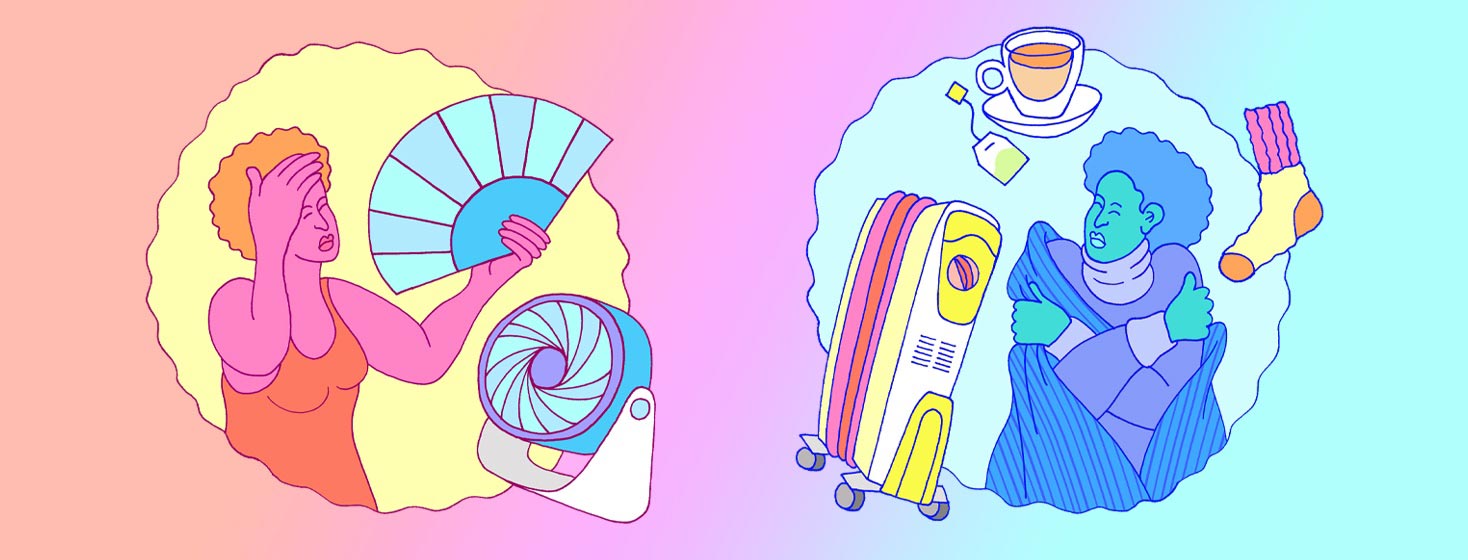The War Between Being Hot vs. Cold
NMOSD sucks. Plain and simple, but out of all of the problems associated with NMO, intolerance to hot and cold has to be the worst. For example, I expect my legs not to function properly. I know I have pain and spasms. However, I simply can't predict when my body will decide to turn into the inferno of Hell or the Polar Express. Let's talk about it.
Temperature intolerance during my latest NMO attack
About a couple of weeks into my latest attack, I started noticing the feeling of being cold all the time. It started in my head and began to work its way down to the tip of my toes. By the time I was diagnosed, it seemed like there was nothing I could do to raise my body temperature. I suspect this was due to nerve damage from the attack leading to increased numbness. After the attack was under control and I was put on immunosuppressants, the hot flashes came. Let me tell you, if you've had a hot flash before, then you know how awful it is.
First I'm hot, then I'm cold
The constant up and down is far from a pleasurable experience. For me, I typically start off my day freezing cold to the bone. It causes serious pain and stiffness in my joints. I get headaches and spasms. Even further, by the time I do get warm, then I'm too hot. At about mid-day, I begin to have a series of hot flashes. When I do, I begin experiencing the following symptoms:
- Nausea
- Headache
- Feeling of passing out
- Increased vertigo and dizziness
- Increased heart rate
- Muscle pain
- Brain fog
The Uhthoff's Phenomenon
Most often, NMOSD is associated with heat intolerance, just like MS. As many of you may know, this heat intolerance is called Uhthoff's Phenomenon. Uhthoff's syndrome is a symptom of multiple sclerosis characterized by the worsening or blurring of vision caused by an increase in temperature, usually associated with exercise or overheating. It is named after a German neuro-ophthalmologist, Wilhelm Uhthoff (pronounced ut-hof), who first described it in 1890. It is also called Uhthoff’s phenomenon or Uhthoff’s sign.1 For those suffering from NMOSD, how do we explain cold intolerance? Why can some of us go from cold to hot to cold so quickly?
Autonomic neuropathy
There's a name to this torture, and it is called autonomic neuropathy. Autonomic neuropathy occurs when the nerves that control involuntary bodily functions are damaged. It can affect blood pressure, temperature control, digestion, bladder function, and even sexual function. The nerve damage interferes with the messages sent between the brain and other organs and areas of the autonomic nervous system, such as the heart, blood vessels, and sweat glands.2 What's one of the causes? You guessed it, autoimmune diseases. Yet another thing to add to the list of NMOSD-related problems that we live with daily.
Tips to manage the cold and heat
It's not a perfect science but I've found a few tricks that have worked for me to help manage and balance the ups and down in my body temperature:
Managing the cold
- Heated blankets
- Thick non-slip socks
- Long pajama pants/long sleeves or/robe (can be rolled up or taken off easily)
- Keeping the house at a compromising temp
- Portable heater
- Warm drinks
Managing the heat
- Portable fan
- Wearing light clothing
- Keeping the house at a compromising temp
- Avoiding overly high activity that causes increased heart rate/potential sweating
- Staying hydrated/cold drinks
I don't mean to complain, but geesh, give us a break already! I must admit, NMOSD is quite a complex disease. I find it fascinating sometimes, but it's no walk in the park to live with. Overall, we got this. As hard as it may be.

Join the conversation